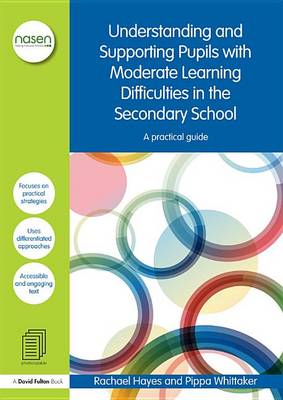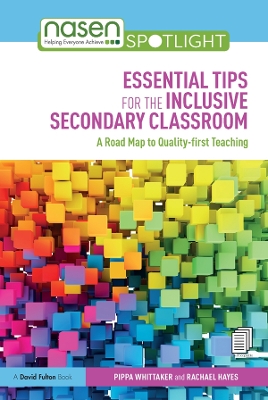nasen spotlight
2 total works
Understanding and Supporting Pupils with Moderate Learning Difficulties in the Secondary School
by Rachael Hayes and Pippa Whittaker
Are you working with students who have Moderate Learning Difficulties?
Do you want to know how best to help them?
Are you confused about what helps and what hinders?
Learners with MLD form one of the largest categories of special educational need in mainstream secondary schools. In most schools, the vast majority of learners with MLD will be taught in mainstream classes much of the time. This book outlines a range of strategies and approaches for supporting these learners. It includes all the vital information practitioners need to know about Moderate Learning Difficulties. Key points covered include:
- Definitions and identification of moderate learning difficulties
- Teaching strategies and approaches
- Developing key conceptual, literacy and social skills
- Effective support from TAs
- Theoretical perspectives on learning
Understanding and Supporting Pupils with Moderate Learning Difficulties in the Secondary School provides an introduction to a wide range of ideas, arguments and perspectives about ways of understanding and supporting learners who are considered to have MLD. This is a much-needed source of knowledge for teachers, TAs, SENCos, Learning Mentors and anyone who supports children and young people with moderate learning difficulties and provides an honest and accessible approach.
Essential Tips for the Inclusive Secondary Classroom
by Pippa Whittaker and Rachael Hayes
This go-to resource provides practitioners with quick, easy and cost-effective ways of improving inclusive practices in educational settings.
Addressing the needs of children with various disabilities, from ADHD, dyslexia and low literacy skills, to physical disabilities, mental health and social needs, the book offers practitioners tips and ideas for ensuring that each and every student is integrated and supported to maximum effect. Clearly presented, conscisely written and easily implemented, tips relate to critical elements of the school setting, including:
- the school environment and classroom organisation
- teaching equipment and resources
- lesson structures and timings
- early recognition and collaboration with families
- student-practitioner interaction and peer relationships.
Tips can be photocopied for display on staffroom noticeboards and circulation to colleagues. Engaging and accessible, this book will be an essential resource for practitioners, SENCOs and Inclusion Managers working in primary and secondary settings.

